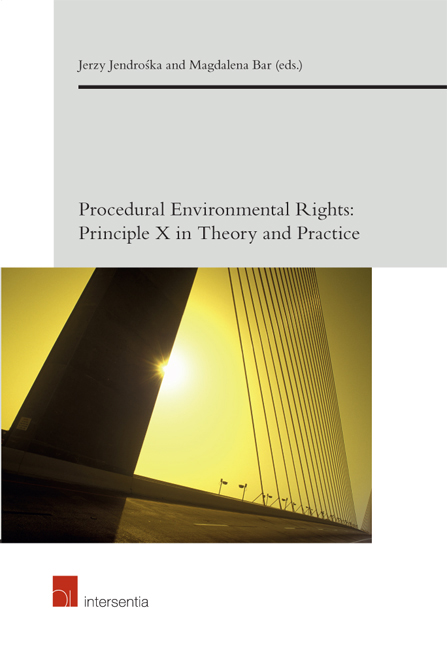Book contents
- Frontmatter
- Contents
- Introduction Procedural Environmental Rights in Theory and Practice
- Procedural Environmental Rights: Status and Developments
- Procedural Environmental Rights in Practice
- Procedural Environmental Rights in the Jurisprudence of the European Court of Human Rights and Their Impact on Criminal Procedure Law
- Ilva: An Environmental Case
- The Improvement of Article 37 of the EU Charter of Fundamental Rights – A Choice Between an Empty Shell and a Test Tube?
- Public Participation
- Access to Justice
- Procedural Environmental Rights and Nature Protection
- Procedural Environmental Rights and EIA
- Procedural Environmental Rights and Climate Change
The Improvement of Article 37 of the EU Charter of Fundamental Rights – A Choice Between an Empty Shell and a Test Tube?
from Procedural Environmental Rights in Practice
Published online by Cambridge University Press: 12 October 2018
- Frontmatter
- Contents
- Introduction Procedural Environmental Rights in Theory and Practice
- Procedural Environmental Rights: Status and Developments
- Procedural Environmental Rights in Practice
- Procedural Environmental Rights in the Jurisprudence of the European Court of Human Rights and Their Impact on Criminal Procedure Law
- Ilva: An Environmental Case
- The Improvement of Article 37 of the EU Charter of Fundamental Rights – A Choice Between an Empty Shell and a Test Tube?
- Public Participation
- Access to Justice
- Procedural Environmental Rights and Nature Protection
- Procedural Environmental Rights and EIA
- Procedural Environmental Rights and Climate Change
Summary
ABSTRACT
This paper proposes an improvement to Article 37 of the Charter of Fundamental Rights of the European Union (CFREU) through the introduction of procedural environmental rights. It challenges the current legal provision, which takes into account solely a policy principle (interest-based approach). The presentation has a three-part structure: the first one analyses the development of European environmental law under different perspectives in order to ascertain the role of the CFREU regarding environmental protection. The second part investigates some aspects in the EU Charter, particularly the legal structure of Article 37, aiming to highlight some opposite ideas and problems concerning the so-called “rights of solidarity”. The third part presents critical comments to the current policy principle approach in Article 37, proposing an alternative by the introduction of procedural environmental rights, according the framework of the Rio Declaration and the Aarhus Convention. The conclusion reaffirms the proposal initially presented, reviewing the main arguments and advantages of such an alternative, specially taking into account the role of individuals and non-institutional actors in the process.
KEYWORDS
Article 37; Charter of Fundamental Rights of the European Union; environmental protection; European environmental law; procedural environmental rights; right to environmental protection.
INTRODUCTION
EU institutions solemnly proclaimed a Charter of Fundamental Rights of the European Union (CFREU) in 2000. It alludes to dignity, freedom, equality, solidarity, citizen's rights and justice – although it did not have a legally binding effect at that time. Article 37 of the Charter specifically addresses environmental protection. Before reading the content of this Article, we should presume that such legal provision is a sort of right to environmental protection, considering that we are here under the scope of a Charter of Fundamental Rights.
Nevertheless, Article 37 has only prescribed a policy principle for environmental protection addressed only to EU institutions. In 2009, the Charter of Fundamental Rights of the European Union became a part of EU primary legislation with legally binding effect. However, the wording of Article 37 remained the same, without any significant modification.
The question is if the perspective of a policy principle (interest-based approach) is coherent with a catalogue of fundamental rights.
- Type
- Chapter
- Information
- Procedural Environmental RightsPrinciple X in Theory and Practice, pp. 97 - 118Publisher: IntersentiaPrint publication year: 2018



